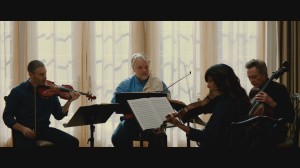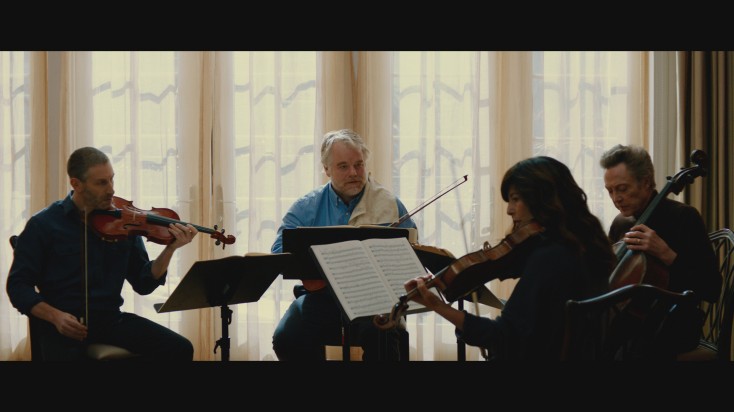
(l-r) Daniel (Mark Ivanir), Robert (Philip Seymour Hoffman), Juliette (Catherine Keener), and Peter (Christopher Walken) in “A LATE QUARTET.” ©Opening Night Productions.
By ANGELA DAWSON
Front Row Features
HOLLYWOOD—Mark Ivanir had 10 days to become a violin virtuoso, or at least appear to be one onscreen, for the drama “A Late Quartet.”
The Russia-born, Israel-raised former soldier and circus performer was a last minute replacement when another actor dropped out of the project.
Though he may not be a household name, Ivanir is a veteran performer whose acting credits include roles in Steven Spielberg’s “Schindler’s List,” “The Terminal” and “The Adventures of Tintin.”
The tall, lanky actor had just hours to make up his mind when writer-director Yaron Silberman called to ask if he were willing to step into the role of first violinist Daniel Lerner, a member of a world-famous string quartet that runs into turbulence after a quarter-century when one of its members decides to retire for health reasons.
After a restless night of contemplation, Ivanir agreed, not quite realizing what he was in for. What followed was an in intensive course in violin study, all the while shooting an episode of an action TV series in Canada.
The 48-year-old father of two says “A Late Quartet” was an opportunity to work on an intriguing project with Hollywood heavyweights Christopher Walken, Catherine Keener and Philip Seymour Hoffman—and he couldn’t pass it up.
Q: So you only had 10 days to get ready?
Ivanir: Less. It was nine days from when I said yes. And for the next five days I was shooting 14-hour days in Canada. I was shooting an episode of “Nikita,” so I was learning the lines on the set between takes.
Q: Did you have previous music experience?
Ivanir: I’d played piano for six years when I was younger. I guess it gave me something to go on. We had some wonderful quartet players, who would spend hours and hours a day with us. When we were looking at the music, I kind of knew what it was. In hindsight, I can thank my parents for making me study music when I was younger because it gave me an idea of what I was doing. When I was 19 or 20 and in the military, I taught myself how to play guitar. So I had something of an advantage of knowing the fingering of strings. It wasn’t alien to me. But I’d never played professionally.
Q: It’s interesting that this story of four people could refer to almost any group of people who’ve been working together for a long time.
Ivanir: Sure. The strength of the movie is that it’s simple. The simplicity is how it is in real relationships. That’s why so many people relate to it.
Q: How much did you actually have to learn to play?
Ivanir: Yaron got bits and pieces of Beethoven’s Opus 131 that we were playing. They gave us recordings and excerpts of five to 15 seconds. That’s what we had to learn. We didn’t learn the whole piece or even bigger bits. We had very little phrases. They were going to shoot close ups of us doing that. On Skype with my family, I would show them what I was learning and I later learned that they were putting me on “mute” because apparently it was unbearable to listen to. (He laughs.) Still, we had the pieces we had to work on and it worked well because the little we had to do we did quite convincingly.
Q: Acting is like being in a string quartet, especially in a small ensemble piece like this where there are four main actors. Did you see some similarity of how a group of actors has to work together to make a unique performance?
Ivanir: Definitely. Even the resemblance between the dynamic of the quartet and what we did and how we were in reality. Phil (Seymour Hoffman) and Catherine (Keener) play a couple in the quartet, and in real life they’re real good friends, and they’ve made a couple of movies together, so they were already a type of unit. The same goes for Chris (Walken), who knew Phil from the theater. I was an outsider very much in the movie, and I was kind of the outsider in the group.
Q: Did your rehearsals ever mimic the tension among the quartet in the film?
Ivanir: As a matter of fact, yes. (He laughs.) We had tense discussions about how it should be and how it should work. There was a lot of work done during the rehearsal process. We’d come in every morning to do a scene and talk about what should be done, and try this and that. We didn’t have a lot of time but still it was an open process. We had the dialogue, but we had the freedom to go off, which we did a lot.
Q: Do you have a favorite scene?
Ivanir: Mine is the breakup scene. It was emotional. We shot it during the first week of shooting and I was still new in this situation. When I woke up that morning, I realized two years before my mom had died on the same day. When I came to set I was kind of charged. When I watch the scene now, it corresponds to what happened then.
Q: Your character is a perfectionist, a loner and an expert in his field. Is that something you can relate to?
Ivanir: Yes, in certain areas. My wife would say I’m sloppy at some things. With my profession, I am a perfectionist, though. I try not to leave anything to chance. I hate being not prepared. I’m obsessive, like Daniel, about the smallest details. There’s an interesting scene where Philip accuses me of being soulless, passionless and technical. It’s interesting because it’s a process that throughout the years I’ve been going through because I rely a lot on technique, which I think is an extremely important thing.
Q: What are your musical tastes?
Ivanir: I have a very strong connection to classical music. My parents had a subscription to the Philharmonic in Tel Aviv and I would go with them as a child. It was part of my upbringing and we had classical music playing at our home. It’s part of my world and I like it very much. I played Beethoven when I was studying music. I’m kind of old school, music-wise. Having said that, I’ve got two little girls, so Gangnam-style is part of my world as well right now. (He laughs.)
Q: You’ve done a ton of TV work including a recurring role on “Royal Pains.”
Ivanir: Yes. I did four episodes of that.
Q: Would you want to become a regular cast member or do you like being free to do other stuff?
Ivanir: There’s something comfortable about doing something and not being limited to doing only that. TV has become an interesting media over the past decade. Right now, I wouldn’t exclude anything. If it’s interesting I might do it.
Q: You ran away and joined the circus when you were younger. How did your circus training help you as an actor?
Ivanir: I didn’t run away. It was after my military stint (in the Israeli Army). I didn’t have to run away from anything, but I did join the circus. In a way, it’s like learning music. It’s not something I can say helped me with learning how to be a violinist, but it did give me discipline, a connotation. In the circus, I was a juggler and an acrobat. It gives you a lot of confidence. There’s something about losing control. When you go into the air and jump backwards for a somersault, you leave the earth and go into the unknown and then you land on your feet, hopefully. When you do that many times, you learn there’s something possible. It gives you confidence in your ability.
Q: Do you still juggle?
Ivanir: I can still juggle but not as well as 20 years ago. But the notion you have to rehearse and repeat over and over again until you get it teaches you about life. So these are skills that not necessarily that I’d use in life. I promise you I’m not going to be doing somersaults now, but I use the process in other things I do.





